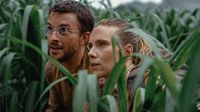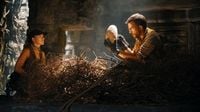Jurassic World: Rebirth, the seventh installment in the iconic dinosaur franchise, has roared into theaters with a mix of nostalgia, fresh faces, and familiar thrills. Directed by Gareth Edwards and penned by original Jurassic Park screenwriter David Koepp, the film attempts to reset the series after the uneven entries of Fallen Kingdom (2018) and Dominion (2022). Yet, despite its ambitions and a stellar cast including Scarlett Johansson, Mahershala Ali, and Jonathan Bailey, Rebirth struggles to find a truly original voice amid echoes of its celebrated predecessor and the sprawling legacy it inherits.
Opening with a striking prologue set 17 years in the past, the film introduces a shadowy research facility where hybrid dinosaurs were engineered, setting the stage for the present-day narrative. The world, it seems, has moved on from dinosaurs; a poignant image early on shows a New York billboard of T-Rexes being whitewashed, symbolizing a society growing weary of the prehistoric spectacle. This theme of fading public interest is woven into the plot, as unscrupulous pharmaceutical executive Martin Krebs (Rupert Friend) seizes the opportunity to exploit dinosaur blood for a groundbreaking heart disease medication. Krebs assembles a team led by ex-military covert ops specialist Zora Bennett (Scarlett Johansson), her trusted mercenary Duncan Kincaid (Mahershala Ali), and bespectacled paleontologist Dr. Henry Loomis (Jonathan Bailey) to infiltrate the off-limits tropical island of Île Saint-Hubert. Their mission: to collect blood samples from three colossal dinosaurs representing land, sea, and air—the Titanosaurus, Mosasaurus, and Quetzalcoatlus.
This island, a lush equatorial microclimate, is also home to a menagerie of dinosaurs, including familiar favorites like velociraptors, Dilophosaurus, and the original T. rex, alongside terrifying new creations such as the six-legged Distortus rex—a mutant hybrid that looms as a monstrous kaiju-like threat. The film wisely employs director Edwards’ expertise in crafting suspenseful CGI sequences, especially a mid-film river-rapids chase where humans and digital dinosaurs collide in a thrilling display of technology and tension. Edwards’ flair shines brightest here, reminding audiences of the visceral excitement that first made the franchise a cultural phenomenon.
Parallel to the mercenary mission is the subplot of the Delgado family—father Reuben (Manuel Garcia-Rulfo), his daughters Isabella (Audrina Miranda) and Teresa (Luna Blaise), and Teresa’s boyfriend Xavier (David Iacono)—who inadvertently sail into dinosaur territory. Their harrowing encounter with a Mosasaurus capsizing their boat injects genuine peril and suspense, evoking the classic Jaws-like tension that Spielberg’s original film mastered. This family’s storyline, though sometimes feeling tangential, offers the most palpable stakes and emotional grounding, as they navigate the dangers of the island with little more than their wits and courage. The interactions among the family members, including familiar familial tensions and protective instincts, provide a relatable human element amid the prehistoric chaos.
Yet, despite the film’s competent performances and moments of genuine thrill, critics have noted that Jurassic World: Rebirth often feels like a “reboot of a reboot,” retreading familiar ground without offering significant innovation. The script, while crafted by veteran David Koepp, sometimes falls into predictable patterns, with character arcs and plot developments that echo earlier franchise entries. For instance, the mission to retrieve dinosaur DNA to develop a lucrative drug recalls the franchise’s long-standing theme of corporate greed and scientific hubris, but without fresh twists or deeper exploration.
Scarlett Johansson’s portrayal of Zora Bennett marks a welcome shift from previous female leads, presenting a tough, no-nonsense operative unburdened by romantic subplots. Mahershala Ali’s Duncan Kincaid adds charm and depth, especially given his character’s backstory involving personal loss, which lends emotional weight to his actions. Jonathan Bailey’s Dr. Loomis offers a brainy, somewhat bookish counterpoint, though some critics found his character’s nervousness and idiosyncrasies, such as his loud mint chewing, occasionally distracting.
One of the film’s standout sequences involves Dr. Loomis witnessing an elegant mating ritual among a herd of Titanosaurs, a moment that captures the awe and wonder the franchise once embodied so powerfully. The cinematography here, with sweeping aerial shots, attempts to evoke the iconic Brachiosaurus scene from the original Jurassic Park. However, some reviewers felt this shot lacked the emotional connection of the original, as it is presented from a detached perspective rather than through the character’s eyes, diluting its impact.
Musically, composer Alexandre Desplat weaves John Williams’ legendary Jurassic Park theme into his score, maintaining the franchise’s auditory heritage while introducing new motifs. This blend of old and new reflects the film’s overall approach: a respectful nod to the past while trying, sometimes clumsily, to carve out a contemporary identity.
Despite these efforts, Jurassic World: Rebirth has been criticized for its uneven pacing and an overstuffed narrative that struggles to balance multiple storylines. The family subplot, while offering suspense, often feels disconnected from the main mercenary mission, resulting in a fractured storytelling experience. Moreover, the film’s reliance on CGI, though skillfully executed in parts, sometimes succumbs to the franchise’s historical pitfalls of overuse and occasional visual artificiality.
The film’s centerpiece antagonist, the Distortus rex, embodies this inconsistency. While its design is impressively monstrous and it delivers some genuinely tense moments, its scale and presence fluctuate throughout the movie, diminishing its menace. Fans hoping for a fresh and terrifying new dinosaur threat may find this creature’s sporadic appearances and shifting size underwhelming.
Adding to the film’s mixed reception is its cautiousness. Where the original Jurassic Park thrived on a sense of wonder and genuine peril, Rebirth often feels like a corporate checkbox—safe and serviceable but lacking the boldness to push the franchise forward. It recycles familiar themes and set pieces, from jungle chases to flare distractions, without the innovation or emotional resonance that made the original so memorable.
Still, there are moments that remind audiences why this franchise captured imaginations worldwide. The chemistry between Johansson and Bailey offers lighthearted charm amid tense sequences, and Edwards’ direction ensures the action scenes, particularly those involving the island’s dangerous inhabitants, maintain a pulse-pounding energy. The film’s runtime of just over two hours allows for a measured pace, giving space to both character moments and dinosaur spectacle.
Jurassic World: Rebirth ultimately sits at a crossroads—a respectful homage to a beloved series that simultaneously reveals its creative exhaustion. It’s a film that fans may enjoy for its familiar thrills and competent craftsmanship but that also underscores the franchise’s need for reinvention. As dinosaurs once again roam the screen, the question remains: will the series find a new path, or is it destined to repeat its past?



